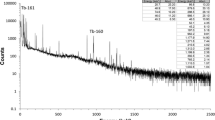Abstract
Nuclear industry advancements and growing concerns about environmental contamination and terrorist activity have increased interest in quantifying radioisotopes in environmental and human samples. Increased presence in the environment, ease of entry into the food chain, nuclear medicine applications, and the possibility of radiological terrorism incidents can lead to human intake of these radionuclides (Radionuclides/Radiation Protection/US EPA (2020). https://www.epa.gov/radiation/radionuclides; Radiation from the Earth (Terrestrial Radiation) (2015) Radiation and Your Health, Centers for Disease Control and Prevention. 7 December. https://www.cdc.gov/nceh/radiation/terrestrial.html). A universal method to screen for and quantify individual radionuclides as well as both levels of alpha and beta emitters would address these concerns.








Similar content being viewed by others
References
Shonhofer F (1998) The use of low-level liquid scintillation spectrometry for rapid measurement and decision making. Radioact Radiochem 9(3):18–24
Kaihola L (2000) Radionuclides identification in liquid scintillation alpha-spectroscopy. J Radioanal Nucl Chem 243(2):313–317
Pujol L, Sanches-Cabeza JA (1997) Role of quenching on alpha/beta separation in liquid scintillation counting for several high capacity cocktails. Analyst 122:383–385
Piraner O, Jones R (2009) Urine gross alpha/beta analysis by Liquid Scintillation Counting for emergency and terrorism preparedness and response. In: Eikenberg J, Jäggi M, Beer H, Baehrle H (eds) LSC 2008, advances in liquid scintillation spectrometry. The University of Arizona
Pates JM, Cook GT, MacKenzie AB, Passo CJ (1998) Implication of beta energy and quench level for alpha/beta liquid scintillation spectrometry calibration. Analyst 123:2201–2207
L’Annunziata M (ed) (2004) Handbook of radioactivity analysis, 2nd edn. Academic Press, New York
Acknowledgements
The authors thank Dr. David Saunders for his past assistance with this manuscript preparation.
Author information
Authors and Affiliations
Corresponding author
Ethics declarations
Conflict of interest
The authors declare that they have no competing financial interest.
Additional information
Publisher's Note
Springer Nature remains neutral with regard to jurisdictional claims in published maps and institutional affiliations.
Disclaimer The findings and conclusions in this study are those of the authors and do not necessarily represent the views of the U.S. Department of Health and Human Services or the Centers for Disease Control and Prevention. Use of trade names and commercial sources is for identification only and does not constitute endorsement by the U.S. Department of Health and Human Services or the Centers for Disease Control and Prevention.
Rights and permissions
About this article
Cite this article
Piraner, O., Jones, R.L. Universal use of alpha/beta mode in liquid scintillation counting analysis for both alpha/beta and single nuclide determination. J Radioanal Nucl Chem 327, 975–983 (2021). https://doi.org/10.1007/s10967-020-07557-z
Received:
Accepted:
Published:
Issue Date:
DOI: https://doi.org/10.1007/s10967-020-07557-z




